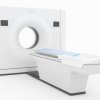At the ongoing RSNA conference Philips has just announced that it received FDA’s 510(k) clearance for its IQon Spectral Detector CT scanner. This is the world’s first such clinical device that is capable of measuring the energy levels of X-ray photons striking the detector. The technology provides similar data to that obtained with dual-energy CT, but without some of the trade-offs that dual-energy technology introduces.
Philips describes its spectral detector technology as being similar to a prism that separates different frequencies of light, but rather with X-rays. The technique spots calcium, iodine, and uric acid crystals, providing tissue composition information in addition to anatomical data, represented by a superimposed color image. This can help to quantify calcium content, identify the nature of kidney stones, and the composition of plaques.
More details about the technology from our coverage of the IQon when it was unveiled last year:
One of the most useful applications, perhaps, is the ability to reconstruct virtual non-contrast exams, by subtracting the iodine signal from post-contrast images. This way only a post-contrast scan needs to be obtained instead of both a pre- and post-contrast scan, so the radiation dose is halved. Many more potential applications exist and in theory it should also allow for scans with much lower doses of contrast medium.
In comparison to dual-energy CT, spectral CT is always on, with all information obtained during the single scan. Thus, there is no need to determine beforehand whether this information is actually needed, as it can be accessed at any time. Furthermore, the radiation dose is not increased, whereas for dual-energy CT the radiation dose tends to be higher than for conventional scans. Also, because data is obtained in a single scan, it is not affected by movement artifacts which may occur when two separate acquisitions are needed, as with some dual-energy CT’s.
source:Carestream
Philips IQon Spectral CT with Advanced Capabilities

